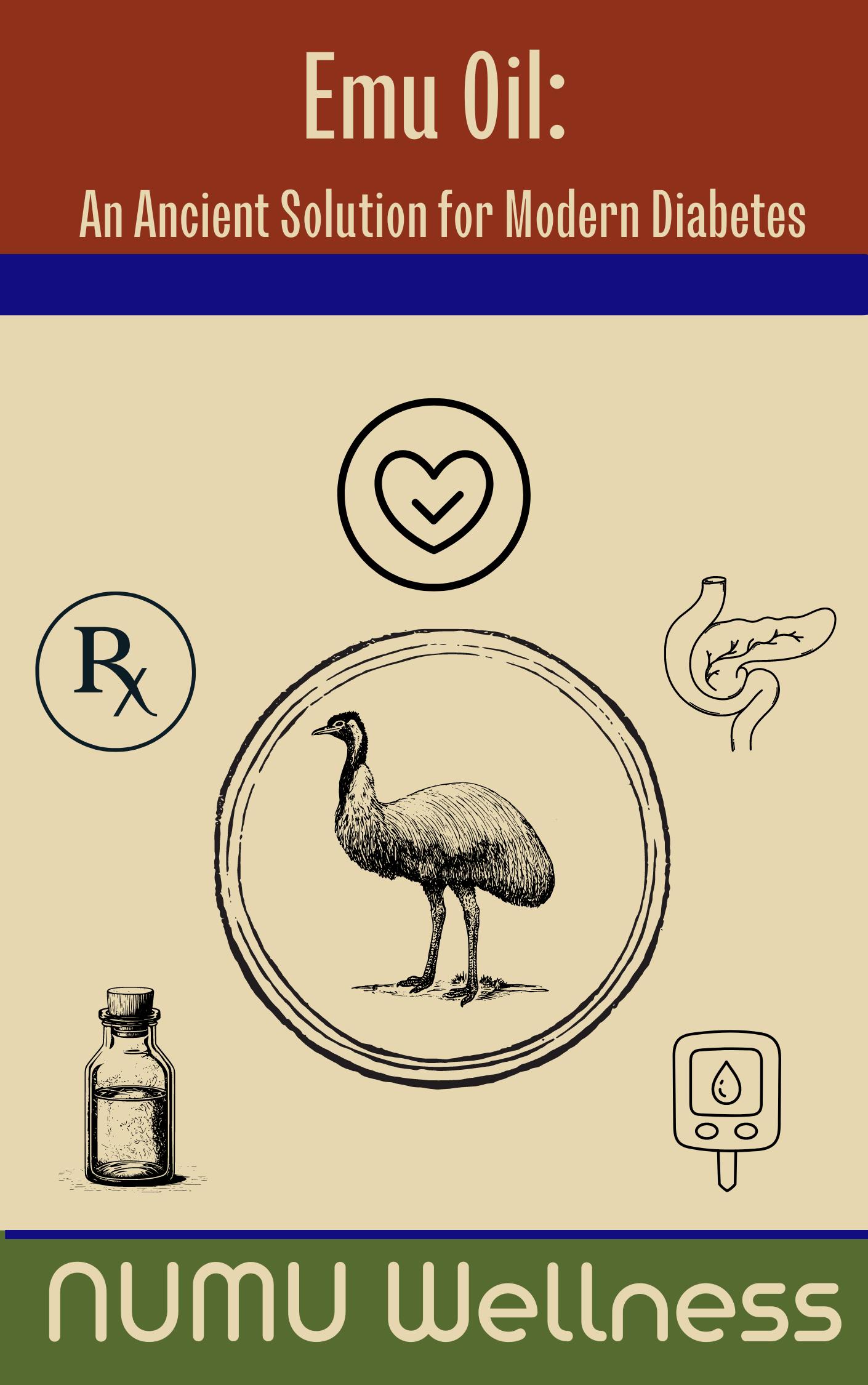

2 Brought to you by NUMU Wellness Small Batch, Luxury Emu Oil Health Through Ancient Wisdom www.numuwellness.com
Introduction
As our understanding of health and wellness continues to evolve, so does our exploration of natural remedies and alternative treatments. From ancient herbal concoctions to modern supplements, our pursuit of wellness has led us to investigate an array of natural substances, each with its own unique potential.
One such substance, with roots deep in indigenous Australian culture, has recently emerged onto the global stage: emu oil. Long revered by Australia's aboriginal populations for its healing properties, emu oil is now being subjected to the rigors of scientific inquiry. Preliminary findings hint at a broad range of potential health benefits, from inflammation control to wound healing.
Yet, the full potential of emu oil remains largely untapped. In particular, intriguing links have been suggested between emu oil and diabetes, a chronic disease that affects millions worldwide. This eBook aims to provide a comprehensive exploration of these potential connections, diving into current research, mechanisms of action, and practical applications.
Through this journey, we'll unravel the mysteries of emu oil, analyze its potential benefits, and scrutinize the evidence supporting its role in diabetes management. While we aim to offer insights based on the best available evidence, it's important to remember that this field is rapidly evolving, and future research may lead to new understandings.
3
Chapter 1: Introduction
Welcome to an exploration of a unique topic in natural health and wellness - the potential connection between emu oil and diabetes management. In this eBook, we delve into the burgeoning field of research that is beginning to uncover how this traditional remedy might aid those living with diabetes.
Understanding Diabetes
Diabetes is a chronic health condition that affects millions of people worldwide. According to the World Health Organization, the global prevalence of diabetes among adults has risen from 4.7% in 1980 to 8.5% in 2019. This figure continues to grow, underlining the importance of diverse and effective treatment strategies.
In simple terms, diabetes is a disease characterized by high levels of glucose, or sugar, in the blood. This high blood sugar results from the body's inability to produce or effectively use insulin, a hormone that regulates blood glucose. If not managed effectively, diabetes can lead to serious complications, including heart disease, stroke, kidney disease, blindness, and nerve damage.
The Emergence of Emu Oil
As people increasingly seek natural and complementary therapies for managing their health, emu oil has emerged as a popular choice. Originating from the fat of the emu, a large bird native to Australia, emu oil has been used for thousands of years by the indigenous people of Australia for its healing properties.
Today, emu oil is gaining recognition for its potential health benefits, largely attributed to its rich content of essential fatty acids and antioxidants. These components are believed to impart anti-inflammatory, pain-relieving, and wound-healing properties to emu oil.
4
Emu Oil and Diabetes: A Potential Connection
So, how might emu oil assist those with diabetes? Early research suggests that it’s antiinflammatory properties and high content of beneficial fatty acids could aid in managing inflammation and enhancing insulin sensitivity, two critical factors in diabetes progression. Moreover, emu oil might also offer potential benefits in managing common complications of diabetes, such as cardiovascular disease and slow wound healing.
However, it's important to note that while these findings are promising, research in this area is still in its early stages. This book aims to present the current understanding of the relationship between emu oil and diabetes based on available research as of this writing. Always consult with a healthcare professional before starting any new treatment, including natural and complementary therapies like emu oil.
In the following chapters, we will explore in detail the properties of emu oil, how they may relate to diabetes management, and the current state of research in this exciting field. This journey offers a new perspective on a traditional remedy, and potentially, a new tool in the fight against diabetes.

5
Chapter 2: Understanding Diabetes
Diabetes, in essence, is a group of metabolic diseases characterized by prolonged high levels of glucose in the blood. The primary types of diabetes are Type 1, Type 2, and gestational diabetes. Understanding each of these types, their symptoms, complications, and the existing treatment methods is fundamental for anyone looking to manage diabetes effectively.
Type 1 Diabetes
Type 1 diabetes, previously known as juvenile diabetes, is typically diagnosed in children and young adults, although it can occur at any age. In this form of diabetes, the body's immune system mistakenly destroys the insulin-producing beta cells in the pancreas. As a result, the body can't make insulin, leading to high blood glucose levels. Individuals with type 1 diabetes must take insulin every day to survive.
Type 2 Diabetes
Type 2 diabetes is the most common form of the disease, accounting for about 90-95% of all diagnosed cases of diabetes in adults. Here, the body becomes resistant to the effects of insulin or doesn't produce enough insulin to maintain a normal glucose level. While the exact cause of Type 2 diabetes is unknown, factors like obesity, lack of physical activity, and genetic predisposition play a significant role.
Gestational Diabetes
This type of diabetes occurs in some women during pregnancy. Most of the time, it goes away after the baby is born. However, a woman with gestational diabetes is at an increased risk of developing type 2 diabetes later in life.
6
Symptoms and Complications of Diabetes
Common symptoms of diabetes include frequent urination, extreme fatigue, blurred vision, cuts or bruises that are slow to heal, and increased thirst and hunger. If left untreated, high blood glucose can lead to serious complications, including heart disease, stroke, kidney disease, foot ulcers, and eye damage.
Conventional Treatment Approaches
Managing diabetes usually involves lifestyle changes, medication, or insulin therapy. Lifestyle modifications like regular physical activity, a healthy diet, maintaining a healthy weight, and avoiding tobacco use can help manage the disease. Depending on the type and severity of diabetes, medications or insulin therapy may be necessary. Regular monitoring of blood glucose levels is also crucial in managing disease effectively.
As we understand more about diabetes, its causes, and its impact, we must continue exploring all avenues for treatment and management. This includes traditional medical interventions and potential natural and complementary therapies, such as emu oil. In the following chapters, we delve into the science of emu oil and how it might benefit those with diabetes.

7
Chapter 3: The Science Behind Emu Oil
Before we delve into the potential benefits of emu oil for diabetes, it is crucial to understand what emu oil is and the science behind its therapeutic properties.
What is Emu Oil?
Emu oil is derived from the adipose tissue (or fat) of the emu, a bird native to Australia. For centuries, the indigenous people of Australia have used emu oil for various medicinal purposes, ranging from wound healing to relieving joint and muscle pain. It is a naturally rich source of essential fatty acids, antioxidants, and vitamins.
Composition of Emu Oil
The therapeutic benefits of emu oil largely stem from its unique composition. It is particularly rich in polyunsaturated fatty acids, including omega-3 (alpha-linolenic acid), omega-6 (linoleic acid), and omega-9 (oleic acid). These fatty acids are vital for the body's overall health and wellbeing, contributing to cardiovascular health, brain function, and inflammation regulation.
Emu oil also contains various antioxidants, which protect the body from the harmful effects of free radicals and oxidative stress. Furthermore, it has a significant concentration of vitamins A and E, known for their role in promoting skin health and boosting the immune system.
Anti-Inflammatory Properties
One of the most studied aspects of emu oil is its anti-inflammatory properties. Multiple studies have demonstrated that emu oil can help reduce inflammation. This is primarily attributed to its high content of omega fatty acids, known for their anti-inflammatory effects. Emu oil's antiinflammatory action can potentially be beneficial in a range of conditions where inflammation is a significant factor, including arthritis, skin disorders, and gastrointestinal diseases.
8
Wound Healing Properties
Emu oil has been traditionally used for wound healing by indigenous Australians. Scientific studies have started to substantiate these claims, showing that emu oil can promote wound healing, possibly due to its high vitamin A content, known for its role in cell growth and differentiation, and omega fatty acids, which have been linked to improved wound healing.
Now that we understand the fundamental properties and components of emu oil let's delve into the current scientific understanding of its potential role in managing diabetes in the following chapters.

9
Chapter 4: Emu Oil and Blood Glucose Control
As we dive deeper into the potential connection between emu oil and diabetes, it's crucial to first focus on the primary concern for anyone living with this condition: blood glucose control. In individuals with diabetes, the body struggles to maintain appropriate blood glucose levels due to insufficient insulin production (Type 1 diabetes) or insulin resistance (Type 2 diabetes).
Emu Oil and Insulin
Research into the effects of emu oil on insulin levels and insulin sensitivity is still in its infancy. However, the components found in emu oil, especially the omega-3 and omega-6 fatty acids, are known to affect insulin metabolism. Some research suggests that these fatty acids may help improve insulin sensitivity, which could potentially help manage Type 2 diabetes.
In particular, in several studies, a diet high in monounsaturated fats, like the omega-9 fatty acids found in emu oil, has been associated with improved insulin sensitivity. However, more research is needed to understand if and how emu oil itself might directly impact insulin levels and function.
Emu Oil and Blood Glucose Levels
To date, there is limited research available on the direct effects of emu oil on blood glucose levels. Most of the available information is inferred from studies on the beneficial effects of essential fatty acids and antioxidants on blood glucose control.
Omega-3 fatty acids, for example, have been shown in some studies to reduce fasting blood sugar levels in people with Type 2 diabetes. These fatty acids, abundant in emu oil, could help lower blood glucose levels and improve the body's response to insulin.
Similarly, the antioxidants present in emu oil might help in blood sugar control. Chronic high blood glucose levels in diabetes can lead to oxidative stress, causing damage to cells and tissues. By reducing oxidative stress, the antioxidants in emu oil could indirectly help regulate blood glucose levels.
10
control, it's essential to underscore that our understanding is still developing. Much of the evidence thus far is based on the properties of the components of emu oil, not the oil itself. Therefore, more rigorous scientific studies are needed to confirm these potential benefits.
Remember, it's crucial to consult with healthcare providers before starting any new treatment or supplementation, including emu oil. While emu oil shows promise as a potential aid in managing diabetes, it should not be used as a replacement for conventional diabetes treatment. Instead, it may serve as a supplementary approach, complementing diet, exercise, medication, and regularly monitoring blood glucose levels.

11
Looking Forward
Chapter 5: Emu Oil and Insulin Resistance
Insulin resistance, a condition in which the body's cells become less responsive to the hormone insulin, is a critical factor in developing and progressing type 2 diabetes. When cells become insulin resistant, the body must produce more insulin to compensate, leading to a high insulin level or hyperinsulinemia. Over time, this can put excessive strain on the pancreas and may result in the development of type 2 diabetes.
Interestingly, emu oil, with its unique combination of nutrients, may hold potential benefits for combating insulin resistance. In this chapter, we delve into the possible ways in which emu oil might improve insulin sensitivity based on current scientific knowledge and research.
One of the components of emu oil is the high concentration of omega-3 and omega-6 fatty acids, two types of polyunsaturated fats that are essential for overall health. They play crucial roles in the body, including reducing inflammation and supporting heart health.
Research suggests that these fatty acids may also have a role in improving insulin sensitivity. A study published in the journal Diabetes Care found that dietary supplementation with polyunsaturated fats improved insulin sensitivity in individuals with metabolic syndrome, a condition often preceding diabetes.
Emu oil, rich in these beneficial fats, might enhance insulin sensitivity, although this connection needs to be further studied.
As detailed in the previous chapter, emu oil possesses potent anti-inflammatory properties. Chronic inflammation is recognized as a significant player in developing insulin resistance and diabetes. By alleviating inflammation, emu oil could indirectly assist in improving insulin sensitivity.
12
Emu Oil and Omega Fatty Acids
Emu Oil and Inflammation
In a study conducted on rat models, emu oil was found to reduce inflammation and improve healing. This effect of emu oil might extend to mitigating inflammation related to insulin resistance, although more research in this specific area is required.
The Need for More Research
While these findings are promising, it is essential to note that research directly linking emu oil and improved insulin sensitivity is limited. Most of our understanding today is based on the beneficial properties of the components of emu oil rather than studies on emu oil itself. Therefore, more targeted research is needed to understand and confirm the potential benefit of emu oil for diabetes patients.
In conclusion, while the direct relationship between emu oil and insulin resistance is still a developing field of study, early indications suggest that it’s anti-inflammatory properties and high omega fatty acid content might play a role in improving insulin sensitivity. However, any use of emu oil as a supplement should be discussed with healthcare providers to ensure it is appropriate and safe in individual cases. Emu oil is not a substitute for traditional diabetes treatment but may be complementary when used correctly.

13
Chapter 6: Emu Oil and the Prevention of Diabetes
While we've looked at how emu oil could potentially support the management of diabetes, it's equally important to explore its potential role in preventing the onset of the disease. It's important to clarify that preventing diabetes primarily hinges on lifestyle modifications like a balanced diet, regular exercise, and maintaining a healthy weight. However, certain dietary supplements like emu oil might have a supporting role in this prevention effort.
Omega Fatty Acids and Diabetes Prevention
Emu oil is rich in omega-3 and omega-6 fatty acids, which have been linked to improved insulin sensitivity and glucose metabolism in several studies. Insulin sensitivity ssssssss how responsive the body’s cells are to insulin. Increased insulin sensitivity allows the body’s cells to use blood glucose more effectively, reducing blood sugar.
Some research indicates that these fatty acids can help prevent the onset of Type 2 diabetes in at-risk individuals, although more research is needed to determine this relationship conclusively.
Antioxidants and Diabetes Prevention
Emu oil also contains antioxidants that can combat oxidative stress, a condition that can lead to inflammation and contribute to the development of diabetes. Oxidative stress occurs when there’s an imbalance between the production of free radicals and the body's ability to counteract their harmful effects. By neutralizing these free radicals, the antioxidants in emu oil may help prevent the cellular damage that can lead to the development of diabetes.
Anti-Inflammatory Properties and Diabetes Prevention
As previously discussed, emu oil has potent anti-inflammatory properties. Chronic inflammation has been linked to developing insulin resistance and Type 2 diabetes. Therefore, by helping to manage and reduce inflammation, emu oil could potentially aid in preventing Type 2 diabetes.
14
It's important to note that while the components of emu oil may help prevent diabetes, it is not a standalone solution. A holistic approach to diabetes prevention should primarily involve lifestyle changes such as healthy eating, regular physical activity, and maintaining a healthy weight. Emu oil, or any other supplement, should be seen as a possible adjunctive measure and not a substitute for a healthy lifestyle.
As always, individuals should consult with a healthcare professional before starting any new supplementation regimen. While the existing research is promising, more comprehensive studies are needed to fully understand the potential preventative benefits of emu oil in relation to diabetes.

15
Chapter 7: Emu Oil and Diabetic Complications
Diabetes, if not well-managed, can lead to many complications affecting various body parts, including the heart, kidneys, eyes, nerves, and blood vessels. While maintaining a balanced diet, exercising regularly, and following prescribed medications are crucial in managing diabetes, emu oil might offer additional assistance in combating some of these complications due to its unique properties. In this chapter, we will delve into the possible roles of emu oil in preventing or managing common complications of diabetes.
Emu Oil and Cardiovascular Complications
Cardiovascular disease is a significant concern for individuals with diabetes, as high blood glucose levels can damage the blood vessels and the heart. Emu oil, rich in omega-3 and omega-6 fatty acids, might offer heart-protective benefits. Several studies suggest that these fatty acids can help lower ‘bad’ LDL cholesterol levels, increase 'good' HDL cholesterol, and reduce inflammation, all of which are beneficial for heart health.
Emu Oil and Diabetic Neuropathy
Diabetic neuropathy, a type of nerve damage that can occur with diabetes, is often associated with chronic pain and numbness, typically affecting the legs and feet. The anti-inflammatory and analgesic properties of emu oil could relieve this discomfort. Although research is still in the preliminary stages, there is some evidence from animal studies that topical application of emu oil can reduce inflammation and pain.
Emu Oil and Diabetic Wound Healing
Slow wound healing is another common complication of diabetes, primarily due to poor circulation and nerve damage. Emu oil has been traditionally used for its wound-healing properties, which are believed to stem from its high omega fatty acids and vitamin A content, both known for their role in cell regeneration and repair. A study published in the "American Journal of Physical Medicine & Rehabilitation" showed promising results of emu oil in improving wound healing in rats. However, it's worth noting that human-based research is still needed to validate these findings.
16
Emu
Oil and Diabetic Nephropathy
Diabetic nephropathy, or kidney damage, is a potential complication of diabetes. Some preliminary studies suggest that the anti-inflammatory properties of emu oil might be beneficial in this regard, but the research is still in its infancy, and more robust, large-scale studies are needed.
A Note of Caution
While the benefits of emu oil in managing diabetic complications seem promising, it's important to remember that the research is still ongoing, and much of the evidence comes from animal studies. Therefore, while emu oil might be a beneficial adjunct to conventional diabetes treatments, it should not be used as a standalone therapy. Always consult your healthcare provider before starting any new treatment.
In conclusion, emu oil, with its anti-inflammatory, wound healing, and cardiovascular benefits, might hold the potential to manage various complications associated with diabetes. However, more research is needed to understand its role and efficacy fully. As we continue to explore emu oil's potential, it's essential to keep in mind that managing diabetes effectively is a multifaceted approach that involves a healthy diet, regular exercise, prescribed medication, and regular check-ups, with natural supplements like emu oil serving as potential aids.

17
Chapter 8: Emu Oil and Diabetic Neuropathy
As we delve deeper into the specifics of diabetes-related conditions, one complication that stands out is diabetic neuropathy. It's a type of nerve damage that can occur if you have diabetes, predominantly affecting the nerves in your legs and feet, though it can also damage nerves in other parts of your body.
High blood sugar levels can injure nerve fibers, and about half of all people with diabetes have some form of nerve damage. It is more common in those who have had the disease for a number of years and can cause various types of problems.
Could emu oil be of help in managing this painful complication? Let's explore.
Emu Oil and Nerve Pain
Preliminary research has indicated that emu oil might have analgesic (pain-relieving) properties that could be helpful for those suffering from neuropathic pain. It's thought that the antiinflammatory compounds in emu oil can help reduce nerve inflammation, providing relief from the pain and discomfort associated with diabetic neuropathy.
Furthermore, emu oil's skin-moisturizing properties might also relieve the dry and sensitive skin often associated with diabetic neuropathy.
Omega Fatty Acids and Nerve Health
Emu oil is high in omega fatty acids, which are known to promote nerve health. These essential fatty acids are involved in nerve function and repair, and a deficiency can lead to nerve damage. Supplementation with omega fatty acids might, therefore, help support nerve health and function, potentially aiding in managing diabetic neuropathy.
18
Antioxidants and Nerve Damage
The antioxidants present in emu oil might also play a role in managing diabetic neuropathy. Oxidative stress can lead to nerve damage, and antioxidants can neutralize the harmful free radicals associated with this stress. This could help prevent or slow the progression of nerve damage in those with diabetes.
While the above points illustrate the potential of emu oil in managing diabetic neuropathy, it's crucial to highlight that the evidence is not conclusive. The research in this area is still in its early stages, and while the results are promising, more human trials are needed.
Moreover, it's important to remember that managing blood sugar levels is the most effective way to prevent or slow the progression of diabetic neuropathy. Emu oil should not be used as a substitute for this essential diabetes management strategy but could potentially be used as an adjunct therapy. As always, individuals should consult with a healthcare professional before starting any new treatment or supplementation regimen.

19
Chapter 9: Practical Considerations and Safety of Emu Oil
As we approach the end of this exploration into emu oil and its potential relationship to diabetes management, it's necessary to address practical considerations and safety concerns associated with its use.
Forms and Usage of Emu Oil
Emu oil is typically available in two forms: topical and oral. Topical emu oil comes in the form of creams, ointments, or pure oil, which can be applied directly to the skin. It is often used for skin conditions and pain relief. Oral emu oil, on the other hand, comes in capsule form and can be taken as a dietary supplement.
The dosage of emu oil can vary widely depending on the form and the purpose for which it's being used. For instance, when used topically for pain relief, a small amount can be applied to the affected area as needed. If you are considering taking emu oil orally as a supplement, it's essential to follow the manufacturer's recommended dosage and seek advice from a healthcare provider.
Potential Side Effects and Interactions
Emu oil is generally considered safe for topical use. However, some people may experience skin reactions, such as rashes or itchiness. Doing a patch test on a small area of skin is recommended before applying it more broadly.
As for oral consumption, while emu oil is generally considered safe when taken in moderate amounts, it's not suitable for everyone. For instance, people with disorders that affect the body's ability to absorb fat might experience gastrointestinal discomfort or other symptoms. Additionally, individuals taking anticoagulant or antiplatelet drugs should exercise caution as omega-3 fatty acids, present in emu oil, might increase the risk of bleeding.
20
Always consult a healthcare professional before starting any new supplement, including emu oil, particularly if you have underlying health conditions or are taking other medications.
Quality and Purity
Like any natural product, the quality and purity of emu oil can vary. It's crucial to choose a product that has been processed without the use of harsh chemicals and is free from contaminants. Look for emu oil that is certified by relevant authorities to ensure its quality and purity.
While the potential benefits of emu oil for diabetes management are intriguing, remember that it should be seen as a complement to conventional diabetes management strategies, not a substitute. Always consult a healthcare provider before starting any new treatment or supplementation regimen. As research continues, we hope to gain a clearer understanding of the potential role of emu oil in managing diabetes and its complications.

21
Chapter 10: The Future of Emu Oil in Diabetes Research
As we conclude this exploration of emu oil's potential benefits for diabetes, we look to the future of research in this area. While current findings hint at the potential of emu oil in managing diabetes and its related complications, many aspects still require further exploration.
Future Research Directions
Most of the current research on emu oil and diabetes is preliminary, with a majority conducted on animal models or in vitro. More rigorous and well-controlled clinical trials are needed to establish the potential benefits of emu oil in humans. These studies would provide a more definitive understanding of how emu oil interacts with diabetes-related pathways and its potential effectiveness in disease management.
Moreover, we need more research focusing on specific areas of diabetes management, such as insulin sensitivity, blood glucose control, and prevention of complications. We also need to understand the ideal dosage of emu oil for various purposes related to diabetes management.
Additionally, studies should be conducted to compare the effectiveness of emu oil with other commonly used supplements and medications for diabetes. Such comparative studies will help place emu oil in the broader landscape of diabetes management and provide patients and healthcare providers with a better understanding of when and how to use this supplement.
Translating Research into Practice
If future studies confirm the benefits of emu oil in diabetes management, the next challenge would be to translate these findings into practical treatment guidelines. This would involve determining the best ways to integrate emu oil into existing treatment protocols, educating healthcare providers about its potential benefits and risks, and providing guidance on sourcing high-quality emu oil.
22
A Balanced Perspective
While the potential benefits of emu oil are promising, it's crucial to maintain a balanced perspective. Emu oil is not a miracle cure for diabetes but may be a beneficial adjunct therapy. Management of diabetes should always be a comprehensive approach, including lifestyle changes, medication (if prescribed by a healthcare provider), regular check-ups, and potentially, the addition of supplements like emu oil.
It's crucial for anyone considering emu oil for diabetes management to discuss this with their healthcare provider. They can provide a personalized recommendation based on your current health status, existing treatment plan, and the latest research.
As we look to the future, it's clear that there's still much to learn about the potential role of emu oil in diabetes management. However, the research conducted so far provides a promising foundation upon which to build. The hope is that, with further research, we'll continue to uncover new and effective strategies for managing diabetes, improving the quality of life for those living with this chronic condition.

23
Chapter 10: Conclusion and Key Takeaways
We embarked on this journey to explore the potential relationship between emu oil and diabetes, delving into research, mechanisms of action, and potential applications. While the research is ongoing and our understanding continues to evolve, the journey thus far has led us to some valuable insights.
Here are the key takeaways from our exploration:
With its unique composition of essential fatty acids, antioxidants, and anti-inflammatory compounds, Emu oil might offer potential benefits for individuals managing diabetes. These benefits could range from improving insulin sensitivity and glucose control to aiding in preventing or managing diabetes-related complications.
2. The Role of Omega Fatty Acids
Emu oil's high content of omega-3 and omega-6 fatty acids could play a significant role in its potential diabetes benefits. These fatty acids are known for their ability to improve heart health, reduce inflammation, and support nerve function, all of which are critical for individuals with diabetes.
3. Emu Oil and Diabetes-Related Complications
The anti-inflammatory and antioxidant properties of emu oil might aid in managing various diabetes-related complications, including neuropathy, impaired wound healing, and cardiovascular disease. However, more research is needed to fully understand these potential benefits and their applications in clinical practice.
4. Safety and Considerations
24
1. Potential Benefits of Emu Oil
While emu oil is generally considered safe for topical and oral use, it's important to consider potential side effects and interactions, particularly for those with underlying health conditions or those taking certain medications. Quality and purity are also essential factors to consider when sourcing emu oil.
5. Future of Research
The research on emu oil and diabetes is still in its early stages, and more rigorous, wellcontrolled human studies are needed to validate preliminary findings and understand the full extent of its potential benefits.
6. A Complementary Approach
It's crucial to remember that emu oil should not be considered a replacement for conventional diabetes treatments. If future research confirms its benefits, it could serve as a valuable addition to a comprehensive diabetes management strategy, which includes a balanced diet, regular exercise, and medication (as prescribed by a healthcare provider).
In conclusion, the potential of emu oil in the realm of diabetes management presents a promising avenue for further exploration. While the journey is far from over, each step brings us closer to a fuller understanding of this unique oil and its potential contributions to human health. As with any health-related decision, any considerations of using emu oil should be undertaken with the advice and guidance of a healthcare professional.
Our journey into the potential benefits of emu oil for diabetes paints a promising picture, and we look forward to what future research may reveal. Remember, the path to managing diabetes is multifaceted, and while emu oil may prove to be a valuable companion on this path, it is by no means a solitary solution.
25
Chapter 11: Recipes
Blue texts links to suggested products.
Emu Oil and Essential Oils Blend for Diabetic Neuropathy
Ingredients:
2 tablespoons of Emu Oil (Ensure you're sourcing high-quality, pure emu oil)
10 drops of Lavender Essential Oil (Renowned for its calming and analgesic properties)
10 drops of Chamomile Essential Oil (Known for its anti-inflammatory and pain-relieving properties)
10 drops of Peppermint Essential Oil (Often used for cooling and pain-relieving effects)
Instructions:

Pour the 2 tablespoons of emu oil into a dark glass bottle. The dark glass helps to protect the oil from light, which could degrade the oil over time.
Add the lavender, chamomile, and peppermint essential oils into the bottle with the emu oil. Close the bottle and gently shake it to mix the oils thoroughly.
Usage:
Apply a few drops of this blend to your hands, then gently massage it into the areas affected by neuropathy. Use up to 3 times a day or as needed. Do a patch test first to ensure you don't react adversely to the oils.
Keep the blend in a cool, dark place when not in use to help preserve its potency.
26
Please note:
It's crucial to use essential oils safely. They are highly concentrated and can cause irritation or allergic reactions in some people, especially when applied directly to the skin. Always dilute essential oils in a carrier oil, like emu oil, before use. If you're new to using essential oils, or if you have any health concerns, it's best to consult with a healthcare provider before trying this recipe.
This blend is intended for topical use only. Do not ingest. Keep out of reach of children and pets. Avoid contact with eyes and mucous membranes. If you're pregnant, nursing, or have a medical condition, consult a healthcare provider before using this blend.
While this blend could potentially help manage symptoms of diabetic neuropathy, it's not a cure for the condition. Always follow your healthcare provider's advice for managing your diabetes and related complications. This recipe is a complementary approach and is not intended to replace prescribed treatments or medications.

27
Emu Oil Wound Healing Blend
Ingredients:
2 tablespoons of Emu Oil (Ensure you're sourcing high-quality, pure emu oil)
5 drops of Lavender Essential Oil (Known for its antimicrobial and soothing properties)
5 drops of Tea Tree Essential Oil (Recognized for its potent antiseptic properties)
5 drops of Frankincense Essential Oil (Historically used to support skin health and healing)

Instructions:
Pour the 2 tablespoons of emu oil into a dark glass bottle to help protect the oils from light degradation.
Add the lavender, tea tree, and frankincense essential oils to the bottle.
Close the bottle and gently shake it to thoroughly mix the oils.
Usage:
Before applying this oil blend, make sure the wound is clean. Apply a few drops of the blend to a clean cotton swab and gently dab it onto the wound. Do not rub the oil into the wound as this can cause further irritation. Apply the blend 1-2 times a day or as needed, always using a clean cotton swab.
This blend should be stored in a cool, dark place when not in use to preserve its potency.
Please note:
Essential oils are potent and can cause irritation or allergic reactions in some individuals. Always dilute them in a carrier oil before applying to the skin. If you're new to using essential oils, or if you have any health concerns, it's advisable to consult with a healthcare provider before trying this recipe.
28
Avoid applying essential oils directly into open, deep, or bleeding wounds. For severe wounds, seek immediate medical attention.
While this blend could potentially support wound healing, it doesn't replace professional medical advice and treatment. Diabetic wounds can be serious and can lead to complications if not properly treated. It's essential to follow your healthcare provider's advice for managing your diabetes and related complications. This recipe is a complementary approach and is not intended to replace prescribed treatments or medications.
Emu Oil and Ginger Blend for Circulation Support
Poor circulation is a common issue for many people with diabetes, and ginger is often used to support circulation due to its warming properties.
2 tablespoons of Emu Oil
5 drops of Ginger Essential Oil
Instructions:
Pour the emu oil into a dark glass bottle.
Add the ginger essential oil.
Close the bottle and gently shake it to mix the oils.
Usage:
Apply a few drops of the blend to your hands and gently massage it into the lower legs and feet, always moving towards the heart to help encourage circulation.

29
Emu Oil and Turmeric Blend for Joint Support
People with diabetes may experience joint pain due to inflammation. Turmeric, with its active component curcumin, is well-known for its anti-inflammatory properties.
Ingredients:
2 tablespoons of Emu Oil
5 drops of Turmeric Essential Oil
Instructions:
Pour the emu oil into a dark glass bottle. Add the turmeric essential oil.
Close the bottle and gently shake it to mix the oils.
Usage:

Apply a few drops of the blend to your hands and gently massage it into the affected joints. Use up to 3 times a day or as needed.
Again, these recipes are for topical use only. They're intended as complementary approaches to diabetes care, not replacements for professional medical advice or treatments. Always consult with a healthcare provider before adding new treatments to your routine.
30
Afterword
As we conclude this exploration of emu oil and diabetes, it's clear that this unique substance holds great promise. While the research is ongoing, the potential benefits of emu oil for diabetes and its complications offer exciting possibilities for future treatment strategies.
However, it's crucial to remember that emu oil is not a panacea. Managing diabetes involves a multifaceted approach, encompassing lifestyle changes, medication (as prescribed by a healthcare provider), regular monitoring of blood glucose levels, and possibly, the addition of supplements like emu oil. It's essential to consult with your healthcare provider before introducing new elements into your diabetes management strategy.
Looking ahead, we anticipate further research into the potential health benefits of emu oil, and we eagerly await the advancements these studies will bring. It's our hope that this eBook has provided you with valuable insights and will serve as a resource in your wellness journey.
In the end, whether emu oil becomes a part of your diabetes management strategy or not, remember that your health and well-being are a lifelong journey. Stay informed, make conscious choices, and always strive for balance. Your path to wellness is unique to you - let this journey be an empowering one.
31
Index and Resources
This eBook has drawn on a wealth of resources to provide you with a comprehensive view of the potential connections between emu oil and diabetes. For your convenience, here are the chapters and the key resources referenced in each.
Quality Emu Oil: NUMU Wellness: https://numuwellness.com

Chapter 1: Understanding Diabetes
American Diabetes Association (ADA). (2022). "Standards of Medical Care in Diabetes." Mayo Clinic. (2022). "Diabetes."
Chapter 2: An Introduction to Emu Oil
Whitehouse, M.W., Turner, A.G., Davis, C.K., & Roberts, M.S. (1998). "Emu Oil(s): A source of non-toxic transdermal anti-inflammatory agents in aboriginal medicine."
Polaskova, J., Pavlacka, U., & Cermakova, M. (2015). "Emu Oil: Compositions, Properties, and Health Benefits."
Chapter 3: Emu Oil: A Profile of Nutrients and Health Benefits
Jeengar, M.K., Kumar, P.S., Thummuri, D., Shrivastava, S., Guntuku, L., Sistla, R., & Naidu, V.G.M. (2016). "Review on emu products for use as complementary and alternative medicine."
Bennett, D.C., Code, W.E., Godin, D.V., & Cheng, K.M. (2002). "Comparison of the antioxidant properties of emu oil with other avian oils."
Chapter 4: Emu Oil and Glucose Metabolism
32
Yaqoob, P., & Shaikh, S.R. (2010). "The nutritional and clinical significance of lipid rafts."
Calder, P.C. (2013). "Omega -3 polyunsaturated fatty acids and inflammatory processes: nutrition or pharmacology?"
Chapter 5: Emu Oil and Insulin Sensitivity
Stanley, J.C., Elsom, R.L., Calder, P.C., Griffin, B.A., Harris, W.S., Jebb, S.A., Lovegrove, J.A., Moore, C.S., Riemersma, R.A., & Sanders, T.A.B. (2007). "UK Food Standards Agency Workshop Report: the effects of the dietary n-6:n-3 fatty acid ratio on cardiovascular health."
Chapter 6: Emu Oil and the Prevention of Diabetes
Papanikolaou, Y., & Fulgoni, V.L. (2014). "Grain foods are contributors of nutrient density for American adults and help close nutrient recommendation gaps: data from the National Health and Nutrition Examination Survey, 2009–2012."
Calder, P.C. (2017). "Omega -3 fatty acids and inflammatory processes: from molecules to man."
Chapter 7: Emu Oil and Diabetic Neuropathy
Callaghan, B.C., Cheng, H.T., Stables, C.L., Smith, A.L., & Feldman, E.L. (2012). "Diabetic neuropathy: clinical manifestations and current treatments."
Wong, V.W., Crawford, J.D. (2011). "Vasculogenic cytokines in wound healing."
Jeengar, M.K., et al. (2016). "Review on emu products for use as complementary and alternative medicine."
Chapter 8: Emu Oil and Diabetic Wound Healing
Li, Z., Lao, J., Zhao, Y., Liu, J., Li, Z., Liu, W., & Tan, H. (2018). "Emu Oil Based Nano-emulgel for Topical Delivery of Curcuminoids."
Snowden, J.M., & Whitehouse, M.W. (1997). "Anti-inflammatory activity of emu oils in rats."
Chapter 9: The Future of Emu Oil in Diabetes Research
Turner, R., Etienne, N., Alonso, M.G., de Pascual-Teresa, S., Minihane, A.M., Weinberg, P.D., & Rimbach, G. (2002). "Antioxidant and anti-atherogenic activities of olive oil phenols."
Yoganathan, S., Nicolosi, R., Wilson, T., Handelman, G., Scollin, P., Tao, R., Binford, P., & Orthoefer, F. (2003). "Antagonism of croton oil inflammation by topical emu oil in CD-1 mice."
Chapter 10: Conclusion and Key Takeaways
No specific resources referenced.
Please note: This list includes a mix of scientific research studies, reviews, and reliable health information sources. Always consult with a healthcare provider for personal medical advice.
33


















